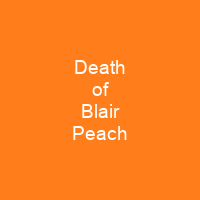Clement Blair Peach was a New Zealand teacher who died after an anti-racism demonstration in Southall, Middlesex, England. In April 1979 Peach took part in an Anti-Nazi League demonstration and was hit on the head, probably by a member of the Special Patrol Group. An investigation by Commander John Cass of the Metropolitan Police’s Complaints Investigation Bureau concluded that Peach had been killed by one of six SPG officers. In 1989 the Metropolitan police paid £75,000 compensation to Peach’s family.
About Death of Blair Peach in brief
 Clement Blair Peach was a New Zealand teacher who died after an anti-racism demonstration in Southall, Middlesex, England. In April 1979 Peach took part in an Anti-Nazi League demonstration and was hit on the head, probably by a member of the Special Patrol Group. An investigation by Commander John Cass of the Metropolitan Police’s Complaints Investigation Bureau concluded that Peach had been killed by one of six SPG officers. The report was not released to the public, but was available to John Burton, the coroner who conducted the inquest. In May 1980 the jury in the inquest arrived at a verdict of death by misadventure, although press and some pressure groups expressed concern that no clear answers had been provided. Celia Stubbs, Peach’s partner, campaigned for the Cass report to be released and for a full public inquiry. An inquiry was rejected, but in 1989 the Metropolitan police paid £75,000 compensation to Peach’s family. The Metropolitan Police have been involved in a series of incidents and poorly conducted investigations, the 1993 murder of Stephen Lawrence, the death of Jean Charles de Menezes in 2005, the botched 2006 Forest Gate raid and the 2009 death of Ian Tomlinson. Peach’s death has been remembered in the music of The Pop Group, Ralph McTell and Linton Kwesi Johnson. The National Union of Teachers set up the Blair Peach Award for work for equality and diversity issues, and a school in Ealing is named after him. He was one of three brothers, the others being Roy and Philip; the former was a solicitor and led the family’s legal campaign after Blair’s death.
Clement Blair Peach was a New Zealand teacher who died after an anti-racism demonstration in Southall, Middlesex, England. In April 1979 Peach took part in an Anti-Nazi League demonstration and was hit on the head, probably by a member of the Special Patrol Group. An investigation by Commander John Cass of the Metropolitan Police’s Complaints Investigation Bureau concluded that Peach had been killed by one of six SPG officers. The report was not released to the public, but was available to John Burton, the coroner who conducted the inquest. In May 1980 the jury in the inquest arrived at a verdict of death by misadventure, although press and some pressure groups expressed concern that no clear answers had been provided. Celia Stubbs, Peach’s partner, campaigned for the Cass report to be released and for a full public inquiry. An inquiry was rejected, but in 1989 the Metropolitan police paid £75,000 compensation to Peach’s family. The Metropolitan Police have been involved in a series of incidents and poorly conducted investigations, the 1993 murder of Stephen Lawrence, the death of Jean Charles de Menezes in 2005, the botched 2006 Forest Gate raid and the 2009 death of Ian Tomlinson. Peach’s death has been remembered in the music of The Pop Group, Ralph McTell and Linton Kwesi Johnson. The National Union of Teachers set up the Blair Peach Award for work for equality and diversity issues, and a school in Ealing is named after him. He was one of three brothers, the others being Roy and Philip; the former was a solicitor and led the family’s legal campaign after Blair’s death.
He emigrated to Britain in 1969 and was soon employed as a teacher at the Phoenix special needs school in Bow, East London. Peach was politically active and joined the Socialist Workers’ Party, Socialist Teachers’ Association and the local branch of the National Union Of Teachers. In 1974 he was charged with threatening behaviour after challenging a local publican’s refusal to serve black customers; he was acquitted. He had been arrested previously when campaigning on political issues, He was also a committed opponent of racism and was active in the Anti-Nazis League. In 2009 the parallels in the deaths proved to be the catalyst in the release of theCass report to thepublic, and Sir Paul Stephenson released the report and supporting documentation. He also offered an official apology to Peach’s family and offered an apology to the police for their handling of the case. Peach helped raise Stubbs’s two daughters from her previous relationship, and the couple regarded each other as husband and wife. After the 1947 partition of India over ten million people were impoverished. From the late 1950s a significant number of Sikhs and Sikhs left the sub-continent to settle in Greater London, where shortages of workers at factories and the Heathrow Airport meant jobs were easily obtainable. Some of the early arrivals were from Poland or the Indian subcontinent. By 1965 all workers from the lower level were common.
You want to know more about Death of Blair Peach?
This page is based on the article Death of Blair Peach published in Wikipedia (as of Dec. 04, 2020) and was automatically summarized using artificial intelligence.







